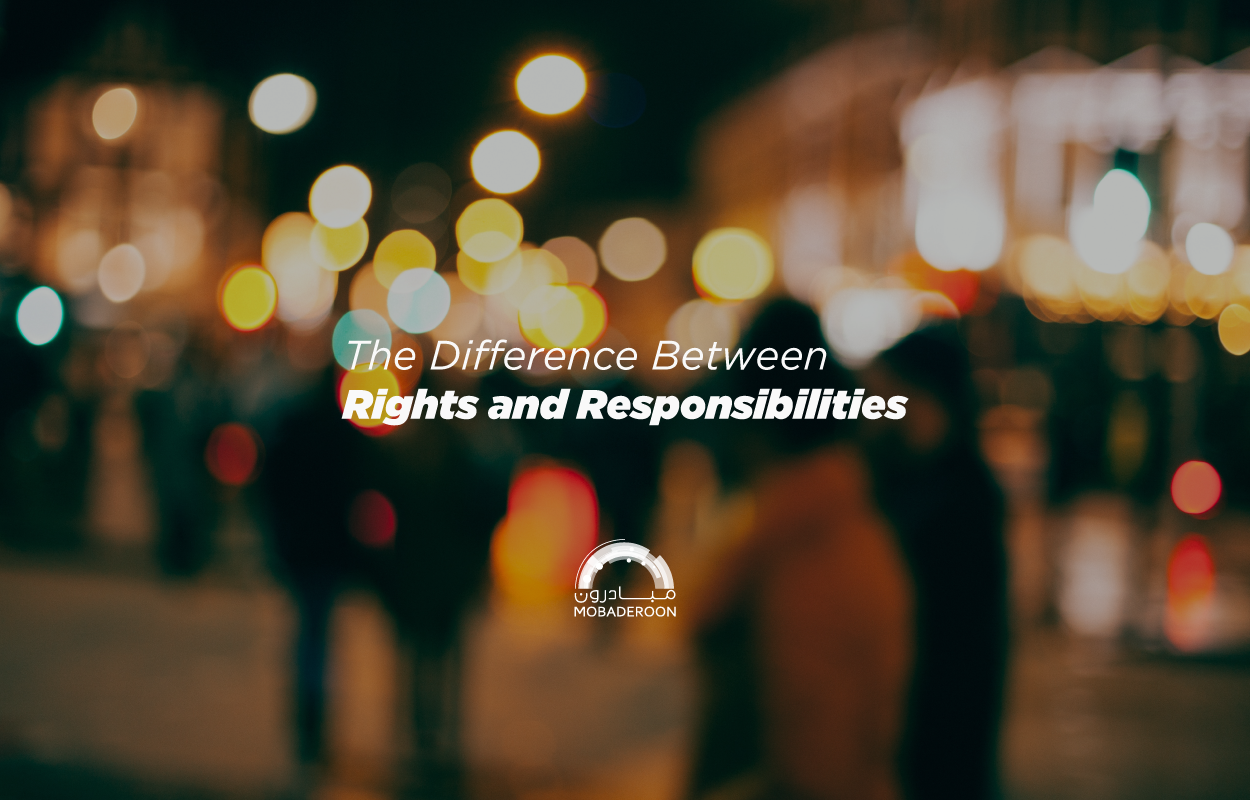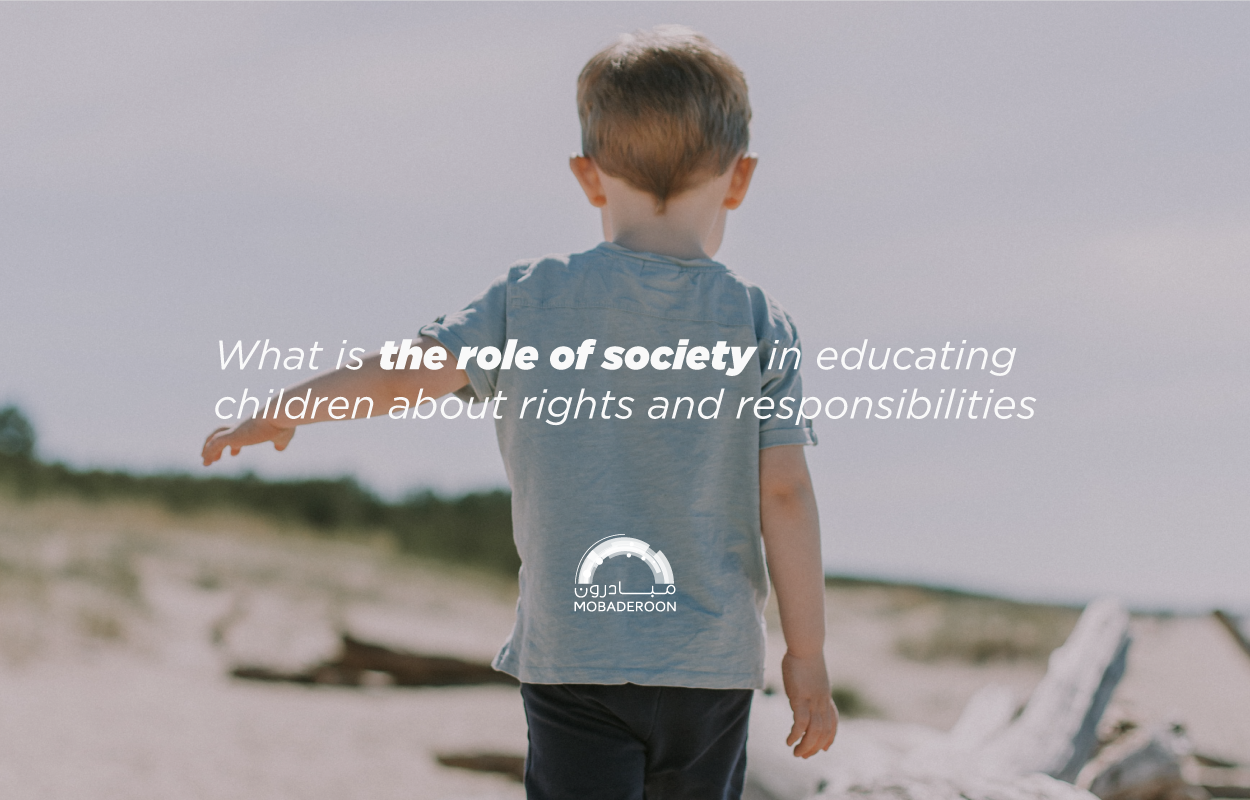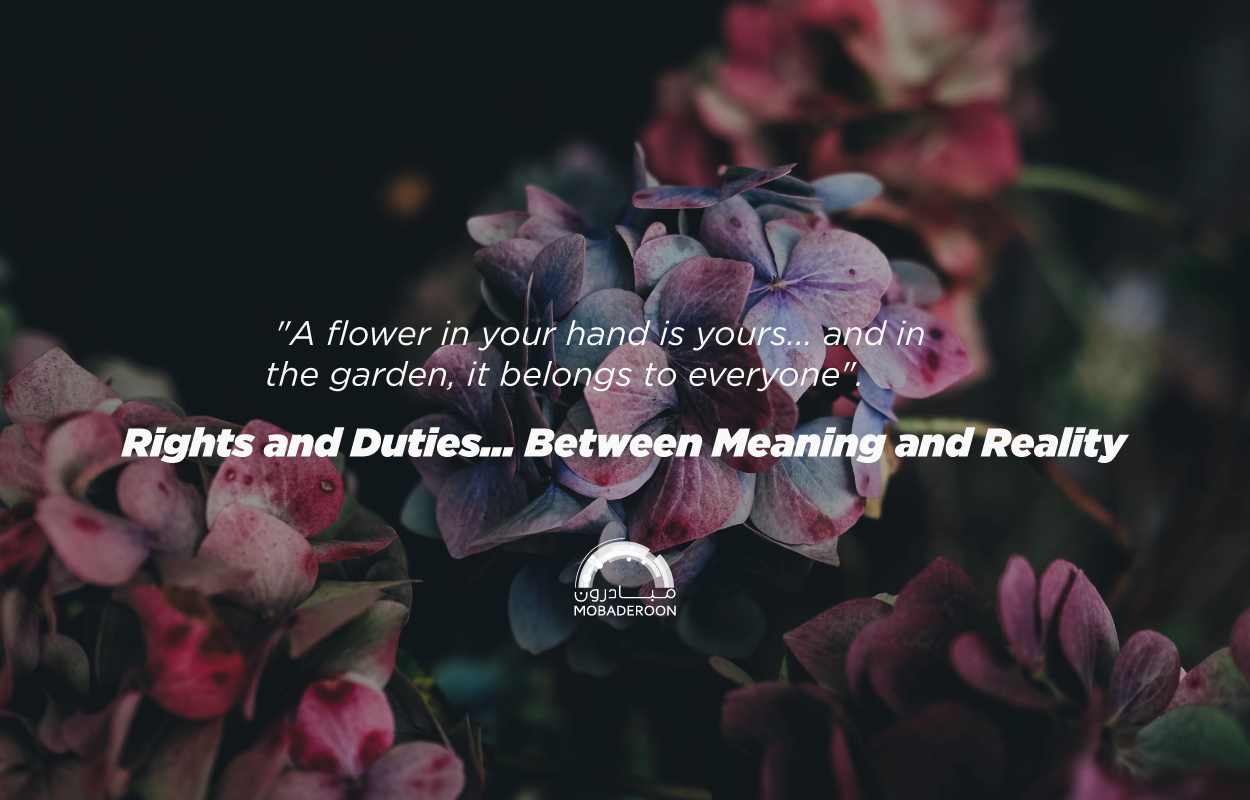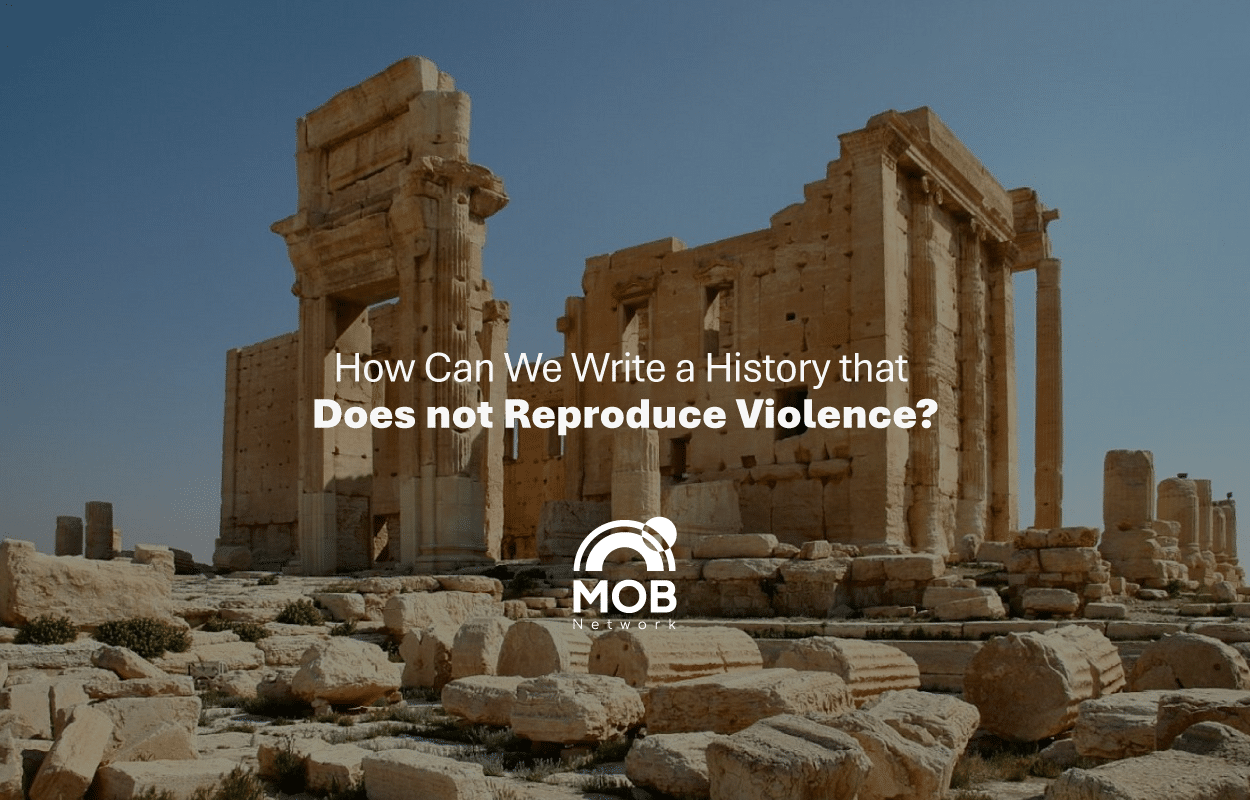“A flower in your hand is yours… and in the garden, it belongs to everyone.” These words were written boldly on a board in one of the public parks scattered throughout my city. In front of the board, a child stands, trying to read what is written on it. Not far from him, another child picks a beautiful flower to savor its fragrance.
That scene and those words have stirred a cascade of questions and inquiries in my mind: Is the content of this phrase a law for this place? Or is it a duty and responsibility? Does the connection between the flower and the garden resemble the connection between rights, duties, and responsibilities? Is the flower meant in its literal sense only? Or is there another implication?
What are rights?
Definition of rights: Rights are essential and necessary for the continuity and survival of society. Neglecting to provide them to their holders leads to the destruction of society. In most cases, the law is responsible for enforcing rights. Rights can only be accessed when justice is obtained. Justice serves as the foundation, and goodness is built upon it, in addition to understanding the meaning and importance of rights.
Definition of rights linguistically: In English, the term “right” has multiple meanings. Right refers to proof, the correctness of speech, and truthfulness. When someone says, “It is your right to do something,” it indicates the obligation to do that thing. The phrase “It is your right to do something” signifies the permission or permissibility of doing that thing.
Definition of rights in terminology: In terminology, rights are defined as fundamental and normative principles established according to social customs, prevailing ethical theories, or the legal system. They clarify allowed actions for individuals or deserving people. In other words, they represent social, ethical, or legal principles for entitlement or attaining freedom.
Importance of rights: Many disciplines rely on rights, such as ethics and law, particularly theories of justice and moral philosophy. They hold great significance for these disciplines. Additionally, they can be considered the foundation of civilizations, as they are one of the solid pillars of any society and its culture. Throughout history, each right has witnessed social struggles for its development. According to the Stanford Encyclopedia of Philosophy, rights shape governments, the content of laws, and the form of ethics.
Types of rights:
There are three types of rights, as follows:
- Natural Rights: These are the rights that humans inherit, integral parts of human nature and the human mind. Every individual entering society possesses some fundamental rights that no government can deny, such as the right to life, property rights, and the right to freedom.
- Moral Rights: These are rights acquired by humans through human consciousness, supported by moral force, and based on the human endeavor to achieve virtue and justice. These rights are not governed by the law, and the state cannot impose them on individuals. If an individual fails to uphold these rights, no legal action is taken against them. Moral rights include rules of good conduct, courtesy, ethical behavior, and examples of these rights are the right to parenthood and the right to honesty.
- Legal Rights: These are rights accepted and enforced by the state. They are imposed on individuals through legal courts, and any violation of a legal right is punishable by law. Legal rights differ from moral rights, and they can be enforced against both the government and individuals. They are available to all individuals, and all individuals are subject to legal rights without discrimination. Any individual can resort to the courts to enforce their legal rights, and legal rights include civil rights, political rights, and economic rights.
What Are Duties?
Definition of Duty Linguistically: The term “duty” is defined in English as what is necessary. To say that something “duty-bound” means it is obligatory and established. Duties can take various forms, including duties towards oneself, others, work, one’s country, and other aspects of life.
Definition of Duty in Terminology: In terminology, duty is defined as anything required of an individual to do or is expected to be done due to moral or legal obligations. It refers to obligatory behavior or expected performance arising from occupying a specific position or role or as a result of explicit or implicit legislative contracts. It can take many forms depending on the nature of the behavior and its specialization.
First Division of Duties: Ethical scholars have divided duties into several categories, including:
- Personal Duties: These refer to duties that individuals owe to themselves, such as etiquette and cleanliness.
- Social Duties: These are the duties imposed on individuals towards their society, such as kindness and justice.
- Divine Duties: These refer to obedience to God and the performance of religious rituals.
Second Division of Duties: Some scholars have proposed another classification of duties into two categories:
- Limited Duties: These duties are included in the nation’s laws, and violations of them can result in penalties for individuals. They are imposed equally on all members of society without discrimination, and both the law and ethics can enforce them. Examples include avoiding theft and murder.
- Unlimited Duties: These duties cannot be included in the nation’s laws because doing so might cause significant harm to society and individuals. It is difficult to determine the exact extent to which these duties must be applied, and it may vary depending on time, place, and individual circumstances. An example is the duty of kindness, which can vary in application based on various factors.
Social living is the foundation of rights and duties. The close connection and interdependence between the individual and their society are the basis of the concepts of rights and duties. If there were no connection between the individual and society, and if the individual were to live alone without any ties, there would be no meaning to rights or duties. However, being part of a society compels individuals to perform various actions to maintain it. Failing to adhere to these actions could endanger the community and lead to its deterioration and downfall.
What Is the Difference Between Rights and Responsibilities?

Rights are advantages or privileges granted to us by law, while responsibilities are our duties or obligations that allow us to enjoy these rights. In other words, every right comes with a duty to comply with and act upon it. For example, I have the right to be treated with respect, and it is my responsibility to respect the rights of others. It is also my right to express my opinions and feelings, and it is my responsibility to welcome the opinions and feelings of others. The same applies to children; for instance, it is their right to play, and it is their duty to ensure their safety and the safety of the environment. Society’s responsibility is to provide a suitable place for play and to convey the concept of children’s rights and responsibilities, ensuring proper and clear awareness.
Children’s Rights:
What Is the Convention on the Rights of the Child?
In 1989, world leaders recognized the need for a special convention for the children of the world because individuals under the age of eighteen often require special care and protection that adults do not need. This recognition aimed to ensure that the world acknowledges the rights of children. The Convention on the Rights of the Child is the first international legal document that legally obligates the states parties to integrate the entire series of human rights, including civil, political, cultural, social, and economic rights, into children’s rights. The convention consists of 54 articles and two optional protocols. It clarifies the fundamental human rights that children should enjoy anywhere, without discrimination. These rights include the child’s right to survival, development, and growth to the fullest extent, protection from harmful influences, abuse, and exploitation, and full participation in cultural and social life. Each right specified in the convention is closely tied to the child’s human dignity, development, and harmonious growth. The convention protects children’s rights by setting standards for healthcare, education, social services, and civil and legal matters related to children. By agreeing to the commitment (by ratifying or joining the convention), national governments have bound themselves to safeguard children’s rights through specific standards and measures to ensure their well-being and development.
Children’s Rights: What is the Convention on the Rights of the Child: In 1989, world leaders recognized the need for a special convention dedicated to the rights of children. Children, often under the age of eighteen, require special care and protection not needed by adults, and this convention aimed to ensure global recognition of children’s rights. The Convention on the Rights of the Child (CRC) is the first international legal document that legally binds member states to incorporate the full range of human rights, including civil, political, cultural, social, and economic rights, into their legal framework concerning children. The convention consists of 54 articles and two optional protocols. It clearly outlines the fundamental human rights that children should enjoy everywhere, without discrimination. These rights include the child’s right to survival, development, and maximum growth, protection from harmful influences, abuse, and exploitation, and full participation in cultural and social life. Each right specified in the convention inherently aligns with the human dignity of the child and their harmonious development. The convention safeguards children’s rights by setting standards for healthcare, education, social services, civil rights, and legal matters related to children. By ratifying and committing to this convention, national governments assume the responsibility of protecting and ensuring children’s rights, thus accepting this commitment before the international community. [8] The convention obliges state parties to develop and implement all of its measures and policies in the best interests of the child. What is the Definition of a Child: According to the Convention on the Rights of the Child (CRC), a child is defined as “every human being below the age of eighteen years unless under the law applicable to the child, majority is attained earlier.” This definition acknowledges the merging of actual childhood, adolescence, and the onset of youth while recognizing the distinct physical, emotional, and psychological characteristics associated with each stage. Additionally, the International Labor Organization and the United Nations Population Division refer to children as those under the age of 15. [8]
Basic Rights of the Child:
The right to life. The right to education. The right to healthcare. The right to protection from abuse, neglect, and exploitation. Rights of children with disabilities. The right to identity. The right to leisure and play. The right to family. The right to expression.
The societal role in conveying the concept of rights and responsibilities to a child is paramount. In our communities, a child represents the initial seed for ensuring the dissemination, application, and sustainability of rights and responsibilities within society. If we can impart and instill these principles within them through specific behavioral patterns, they will be empowered to embrace these rights and carry out their duties with a sense of high responsibility.
In this regard, several developmental, social, and civil organizations engage in specialized interventions aimed at enhancing the understanding of rights and responsibilities in children, empowering them to adopt this concept. One such organization is “Aflatoun,” which adopts a socio-financial educational approach that is interactive and aids children in understanding and exploring their own identities. It instills a sense of responsibility, allowing them to comprehend their rights and motivating them to enjoy them fully. Furthermore, it broadens their awareness regarding the duties that contribute to creating a healthy environment not only for themselves but also for other children in society. Ultimately, this effort strives to mold them into future role models of active citizens capable of effecting positive change.
What is the role of society in educating children about rights and responsibilities?

All these questions prompted me to explore several points that need to be illuminated regarding rights and duties, and the distinction between them, as well as the rights of the child – especially since “fragrant flowers are a symbol of children” in our literature – and the societal role in shaping children’s understanding of rights and responsibilities. Based on this, we will attempt to answer these questions.”
The foundation of civilizations, as one of the solid pillars of any society and its culture, has witnessed throughout history social conflicts over every right until they evolved. According to the Stanford Encyclopedia of Philosophy, rights are what shape governments, the content of laws, and elucidate the form of ethics.
What is the Aflatoun Organization?
Aflatoun International is a non-governmental organization that focuses on educating children about their rights, responsibilities, and financial resource management through social and financial education. The headquarters of Aflatoun’s programs is located in Amsterdam, Netherlands. Currently, Aflatoun’s programs, which consist of Aflatoun, Platina, and Playouth, are being implemented in 116 countries through 192 partner organizations.
Mor about Aflatoun:
Did the grandmothers of Newton, Aflatoun, and Einstein Feed Them the Head of the Sparrow?!
Aflatoun Programs:
Aflatoun‘s programs are part of a broader movement (Aflatoun programs and Platina) targeting young children aged 6 to 14 and adolescents aged 15 to 18. These programs provide them with social and financial education. The Playouth program is designed for young men and women aged between 18 and 25. Aflatoun’s goal is to empower children and young people to understand their rights and responsibilities, equipping them with the knowledge and skills necessary for responsible financial management. The interactive social and financial programs encourage critical and constructive thinking, enabling children and youth to develop life and social skills.
Their ages range from 16 to 24 and beyond, and they are eager participants in this program aimed at enhancing young people’s income management abilities. All of these programs are geared towards social and financial education, helping youth of all ages to think critically, learn about their rights and responsibilities, as well as acquire financial knowledge and skills that empower them to make optimal use of resources.
These programs also assist them in contemplating the movements for change they will engage in and becoming active contributors to the world. Social education molds them into responsible citizens who thirst for knowledge and contribute to social issues that affect them, while financial education imparts essential skills related to saving, budgeting, and initiating projects to children.
Aflatoun, Rights and Responsibilities: Each of Aflatoun’s programs is deeply concerned with rights and responsibilities. The Platina program, in particular, places a comprehensive focus on rights and duties through interactive exercises incorporated into various sessions under different headings:
- Knowledge of Rights.
- Our Diverse Abilities.
- Faith and Religion.
- Sexual Culture.
- Gender and Social Roles.
- Different Races.
- Connection to the Land.
- Child Labor.
- Be a Change Maker.
Following these sessions, diverse and inspiring outcomes are generated, upon which activities, initiatives, or advocacy for causes that children and youth care about can be built. They can then face these issues in their own unique way.
Yet, between rights and duties, in meaning or in reality, there remain many gaps that we cannot ignore within the social sphere of a child, starting from the family, the playground, the streets, the school, and their peers. These gaps form a significant barrier that the child often perceives when attempting to assert their natural rights and fulfill their duties towards themselves and their community. The greatest responsibility in our reality falls upon individuals and civil, developmental, and official organizations alike. They must work together to promote initiatives and interventions that uphold and defend children’s rights.
Children’s rights are not merely written agreements on paper; they are a fundamental necessity for our societies. They represent the first step in building the development of our communities, ensuring a secure system for children first, which can then be sustained in the future. After all, they are the future. What we provide for them now, they will shape into the future. Today’s blossoms are tomorrow’s leaders.
“Nothing affects human future childhood ability and children's psychological experiences”
Dr. Adel Saddeq Tweet











